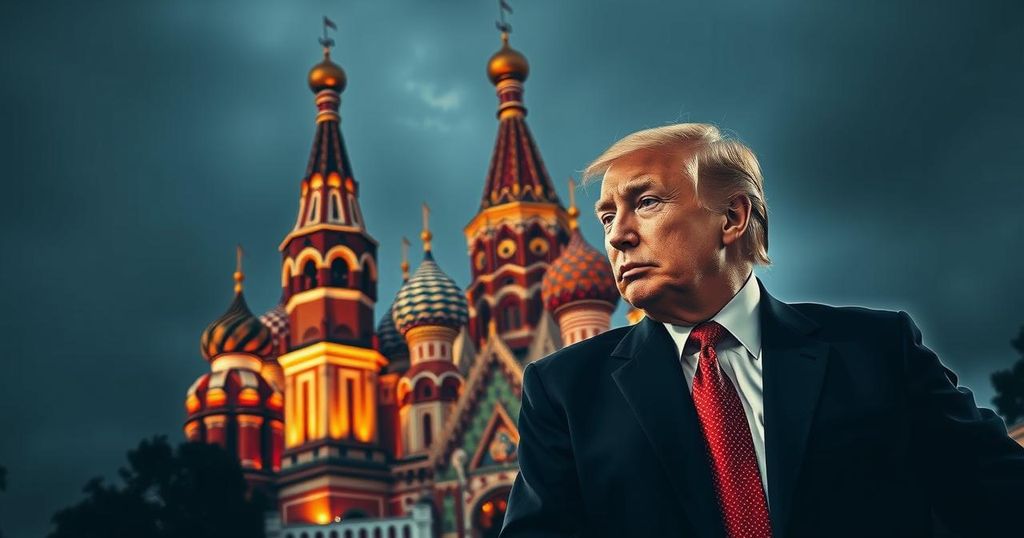Moscow’s Cautious Outlook on a Potential Second Trump Term

The article discusses Moscow’s initial optimism about Donald Trump’s presidency in 2016, which has since been replaced by caution due to the heavy sanctions imposed during his term. It highlights the mixed feelings among Russians regarding the US and the political impact that a potential second Trump term may have, particularly in relation to the Ukraine conflict and international diplomacy. The Kremlin prefers a contentious US election that may distract from foreign affairs.
Moscow’s optimism regarding Donald Trump’s presidency has significantly tempered since his first term. In 2016, Russian political figures expressed exuberance at Trump’s unexpected election victory, anticipating improvements in US-Russia relations. Notably, Vladimir Zhirinovsky, a prominent ultranationalist politician, marked the occasion by celebrating with excess champagne. Figures like Margarita Simonyan, editor-in-chief of state-funded RT, also exhibited their enthusiasm publicly, symbolized by driving around Moscow displaying an American flag. Initial hopes revolved around Trump potentially relaxing sanctions and acknowledging Russia’s claims over Crimea. As Konstantin Remchukov, editor of Nezavisimaya Gazeta, stated, “The value of Trump was that he never preached on human rights in Russia.” However, the administration soon introduced stringent sanctions against Russia, leading to widespread disillusionment by the end of his presidency. Fast forward to the present, Russian officials exhibit a more cautious stance on the prospect of Trump returning to the presidency. President Vladimir Putin’s ambiguous compliment regarding Kamala Harris has been interpreted largely as humor aimed at generating confusion. Trump’s campaign rhetoric, particularly regarding military support to Ukraine and a soft approach toward Putin, resonates positively with the Kremlin. Meanwhile, Kamala Harris’s firm stance on supporting Ukraine paints a contrasting picture, further complicating Russia’s response. Speculation arises from the Kremlin favoring a tightly contested election that could result in confusion and disruption within the United States, diverting attention from international affairs such as the Ukraine conflict. Relations between the US and Russia have spiraled downwards, particularly since Barack Obama’s presidency, worsening under Trump, and becoming critically strained under Joseph Biden post-invasion of Ukraine. Historically, US-Russia relations were rooted in opportunities for collaboration as witnessed during the Reagan-Gorbachev era. Today, the geopolitical landscape is starkly different, with mutual animosity dominating public sentiment. At a Moscow park containing a symbol of friendship between American and Soviet children, opinions vary, with some Russians expressing resentment towards the US, while others hope for peace and cooperation. The dynamics of international relations, presidential candidacies, and public sentiment suggest that the interactions between Russia and America will remain intricate and contentious regardless of the election outcomes.
The article delves into the complex relationship between Moscow and the United States, particularly in the context of Donald Trump’s presidency. Following Trump’s election in 2016, Russian officials and public figures expressed optimism that his administration would lead to an improvement in US-Russian relations, marked by celebratory acts emanating from the Kremlin. However, as his term progressed, the introduction of significant sanctions against Russia resulted in disillusionment among Russian politicians and citizens alike. The current political climate sees a more cautious approach from Russia as they assess the potential implications of a second Trump term amid ongoing tensions and the conflict in Ukraine.
In conclusion, the anticipation surrounding Donald Trump’s potential return to the presidency is tempered by a history of disappointments from his previous term and ongoing geopolitical tensions. The Kremlin’s approach is characterized by caution and a desire for political chaos in the United States to distract from international concerns. As both nations grapple with their fraught relationship, public opinion in Russia reflects a mixture of hostility and a yearning for amicable relations, highlighting the complexities of US-Russian interactions in this electoral cycle.
Original Source: www.bbc.com








